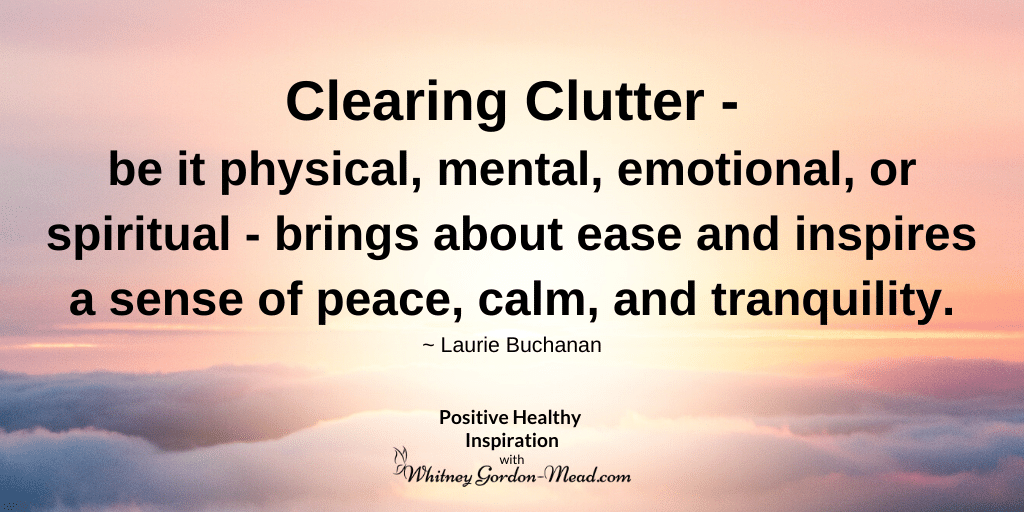
You’re driving home, exhausted from a long day at work. You walk through your front door, only to be greeted by…
Stacks of mail sitting on the kitchen counter…
Newspapers and magazines laying around the living room…
Half-finished projects on the dining room table…
Hampers of laundry in the hallway…
Piles of paperwork covering your desk…
UGHH… right?
Clutter is like standing in quicksand. You’re slowly sinking and you can’t escape.
And if you let clutter swallow up your life, you risk burning out – fast!
There are many different types of clutter you’ll encounter — physical, mental, emotional, and spiritual.
In this article, we’ll be exploring physical clutter and how it causes burnout. I’ll also share a few tips on how to declutter your physical environment to assist you in avoiding the signs of burnout.
What is Clutter?
Physical clutter is the accumulation of stuff in your life. It often creeps up on you without notice. Maybe you have certain places where you mindlessly leave your things – items of clothing, pieces of mail, receipts… Slowly, things pile up and before you know it, you’re drowning in clutter.
Eventually, your home becomes a source of stress rather than a sanctuary from the outside world.
Is Clutter Bad For Your Health?
Visual clutter is a physical reminder of an unfinished task. Stacks of dishes are reminders to wash them. Piles of unopened mail are reminders to open and review them. When you put these tasks off, they take up space in your brain and cause extended stress.
Your brain loves organization, so a messy environment conflicts with your brain’s desire for efficiency. When this happens, your brain signals your body that you’re stressed and anxious.
Clutter also creates unnecessary friction in your life.
How often are you late to work because your car keys were buried underneath all the clutter? How much time do you waste trying to find an important document when it looks like your desk was hit by a whirlwind?
Your health can endure if this happens a few times.
But if this happens regularly, you may experience symptoms of clutter stress syndrome. You can start feeling anxious whenever you walk through the front door or guilt over being unorganized. And if you let clutter take over your life, clutter stress syndrome can lead to serious burnout.
When you declutter your home, you remove the visual reminder. Your space feels lighter. Also, energy flows more gracefully through your home when it’s not obstructed by unsightly clutter.
How to Declutter Your Space and Prevent Burnout
Are you ready to alleviate clutter stress syndrome and start enjoying life again? If so, I can’t wait to share these tips with you.
#1 Organize Physical Clutter in 15-Minute Bursts
Planning a full-scale decluttering and deep cleaning of your home can feel overwhelming. Depending on the size of your home, this project may take an entire weekend.
Rather, build a smaller daily habit of tidying up.
Set a timer for 15 minutes of dedicated cleaning. Do your best to avoid distractions. You’ll be surprised how much you can accomplish if you focus intensely on one task for 15 minutes.
Focus on putting away out-of-place items and clearing surfaces. This will have the greatest visual impact.
Do you have a similar tip to build the habit of decluttering into your life? Share it below in the comments. I’d love to know!
#2 Does It Spark Joy?
Marie Kondo is an organizing consultant and author of the popular book The Life-Changing Magic of Tidying Up: The Japanese Art of Decluttering and Organizing.
In her book, she teaches people how to simplify their lives by decluttering.
One tip she teaches is to take inventory of all your belongings. Next, pick up each item and ask yourself, does this spark joy?
If not, remove it from your life.
The philosophy behind this tip is to practice intentionality with your belongings. The items you surround yourself with should serve you, spark joy, or inspire. This tip might be especially helpful if you’re prone to hoarding items.
One thing that sparks joy for me is a gift from my husband: a rose quartz angel figurine. This beautiful angel reminds me that a higher power is always supporting and guiding me.
How about you? Comment below one thing that sparks joy in your life.
#3 Don’t Forget the Digital Clutter
Digital clutter is important to address because much of our lives are spent on the internet.
Businesses are moving online. Social media is making it easier to communicate. You can even shop for groceries on a mobile app.
However, digital clutter is easier to accumulate because there’s no physical accumulation in the real world.
When you’re using your laptop, look at how many browser tabs you have open. If there are over ten tabs open, ask yourself if it’s necessary to jump between those different sites.
Can you better sharpen your focus if you had only two or three tabs open?
Take a look at your digital files. If you’re a student or if you work online, how are your documents organized? Are they scattered on your desktop or haphazardly placed in miscellaneous folders?
This unorganized approach can leave you feeling stressed or annoyed when you can’t find the file you need. While this may not seem like a monumental issue, remember that burnout isn’t always isolated to a single incident. Sometimes, it’s an accumulation of small things over time.
Take some time to organize your digital files. You’ll thank yourself later when you can easily access them because they’re correctly labeled and stored.
Decluttering Can Improve Your Well-Being
Clutter often weighs us down and can shorten the path to burnout.
After you declutter your environment, you might feel lighter — as if a burden was lifted from your mind and body.
However, it’s easy for clutter to creep back into your life. Do your best to transform the above tips into daily habits for yourself. Similar to practicing consistent self-care, don’t forget to give your physical space your time and attention. Regular self-care and decluttering are essential for burnout prevention and your overall well-being.
Decluttering is just one way to fortify yourself against burnout. For more tips on burnout prevention and management, be sure to sign up for my email list.

